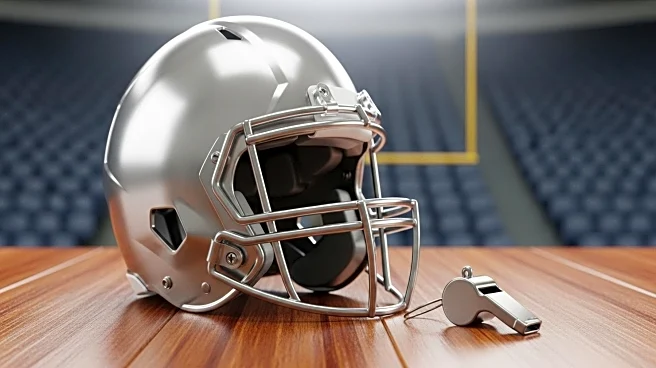What's Happening?
Dallas Cowboys owner Jerry Jones has been fined $250,000 by the NFL following a controversial gesture during a game against the New York Jets. Jones was seen making a one-finger salute from his suite after Dak Prescott's fourth touchdown pass in the Cowboys' 37-22 victory. Jones claims the gesture was meant to be a celebratory thumbs up directed at Cowboys fans, not Jets fans. The incident went viral on social media, prompting the NFL to impose the fine, which Jones plans to appeal. This is not the first time an NFL owner has been fined for similar behavior, with previous fines issued to Carolina Panthers owner David Tepper and late Tennessee Titans owner Bud Adams.
Why It's Important?
The fine against Jerry Jones highlights the NFL's strict stance on maintaining professional conduct among team owners and representatives. Such incidents can impact the league's image and fan relations, especially when they go viral on social media. The financial penalty serves as a reminder of the league's commitment to upholding standards of behavior. For the Cowboys, this incident could affect their public perception and fan engagement, particularly in light of their current season performance. The fine also underscores the broader implications of actions taken by high-profile figures in sports, where public scrutiny is intense.
What's Next?
Jerry Jones plans to appeal the NFL's decision, which could lead to further discussions and potential adjustments to the fine. The outcome of the appeal may set a precedent for how similar incidents are handled in the future. Meanwhile, the Cowboys will continue their season, aiming to improve their record and maintain focus amidst the controversy. The NFL may also review its policies regarding conduct and fines to ensure clarity and fairness in enforcement. Stakeholders, including fans and team officials, will be watching closely to see how the situation unfolds.
Beyond the Headlines
This incident raises questions about the balance between personal expression and professional conduct in sports. It also highlights the role of social media in amplifying actions and their consequences. The situation may prompt discussions on the ethical responsibilities of sports figures and the impact of their behavior on team dynamics and fan loyalty. Additionally, it could lead to broader conversations about the cultural expectations of sportsmanship and decorum in high-stakes environments.











